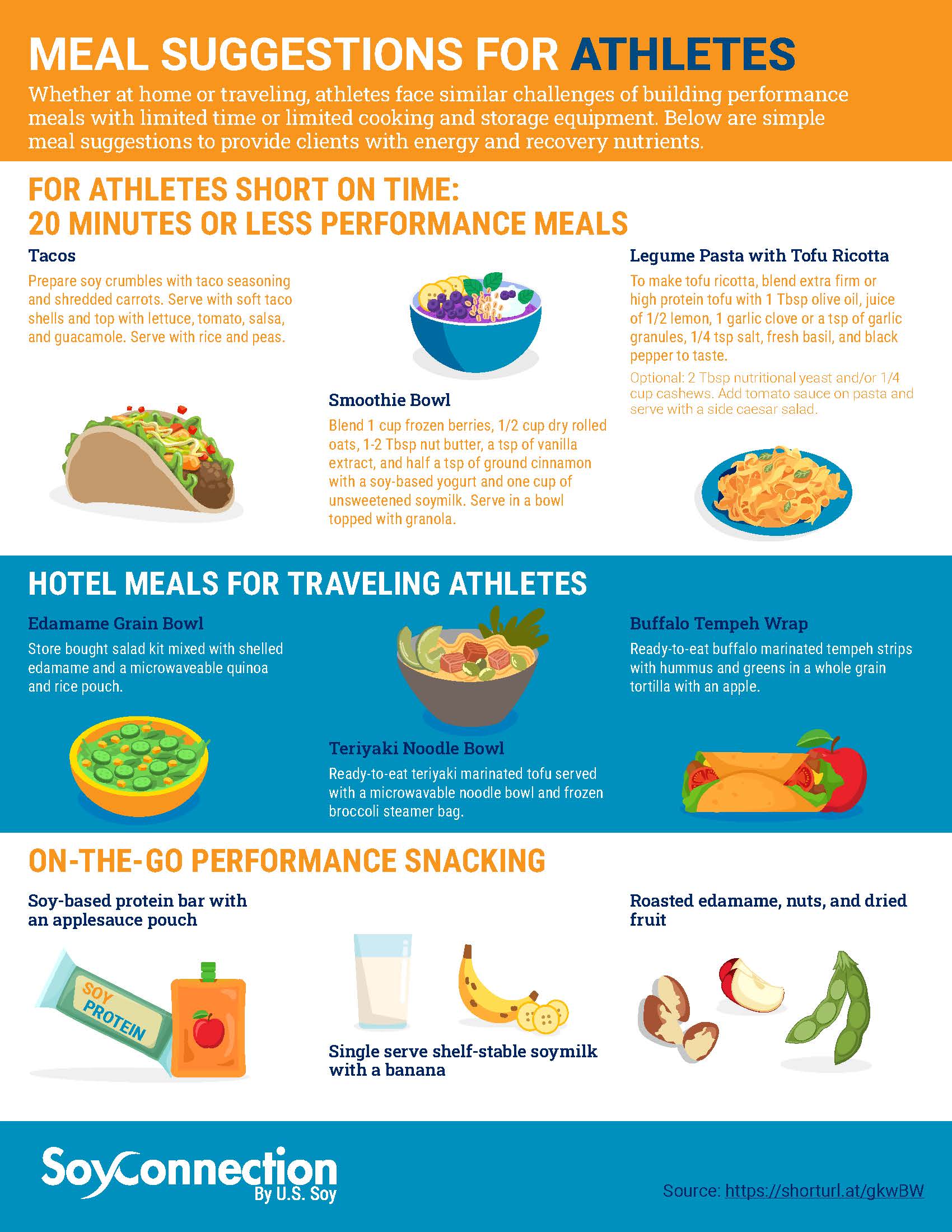Protein is a regular topic of conversation among health professionals supporting elite athletes. Many elite athletes want to consume more plant proteins for performance as well as personal health. While plant-forward diets are sometimes associated with concerns about protein quality and adequate protein consumption, the primary need among this group is identifying convenient solutions for busy schedules and frequent travel.
Plants can supply adequate protein quality and quantity for elite athletes even if they opt for a plant protein-only diet; although, awareness of the protein content of convenient foods is crucial. Dietitians should discuss total daily protein consumption with a range from 1.2-2.0g/kg of body weight (bw)/day, protein intake timing (ingesting moderate doses every 3-4 hours), and essential amino acids and in particular, leucine.1
Leucine is an amino acid that triggers muscle protein synthesis, so consuming adequate amounts may boost muscle recovery and long-term athletic performance. The ideal consumption of leucine is between 700-3,000mg accompanied by at least 0.25g high-quality protein/kg of bw and balanced essential amino acids after exercise and at meals throughout the day.1 As a high-quality protein containing leucine, soy protein has long been found to promote muscle repair similarly to whey protein.2
Evidence also shows soy lowers blood cholesterol levels,3 an attribute even elite athletes should be mindful of. Athletes struggle to obtain balanced and nutritious meals at appropriate times when at home or traveling and seek guidance to manage blood lipids. This concern is a common thread among athletes in sports such as baseball, as well as those competing in distance running and triathlons.
Since many elite athletes have rigorous travel schedules, convenience, muscle recovery, and overall health are important factors. Because of their variety and versatility, soy foods are a good fit. Health professionals can help athletes identify soy food options in corner stores, quick-serve menus, and those that can be ordered via grocery delivery services. It is also beneficial to outline portion sizes that will provide the recommended leucine doses, along with total protein, so athletes can adjust portions to meet their personal needs.
Protein and Leucine Quantity Per Serving of Soy Foods4-9
|
Soy Food (Portion Size) |
Total Protein Content |
Leucine Content |
|
Shelled Edamame (1c., 155g) |
18g |
1.15g |
|
Soybeans, mature seeds, dry roasted (30g) |
13g |
1g |
|
Extra Firm Tofu (3oz., 85g) |
8.5g |
0.7g |
|
Tempeh (4oz., 100g) |
20g |
1.4g |
|
Soymilk 1c. (8oz.) |
8g |
0.452g |
|
Soy Protein Isolate (1oz., 28.5g) |
25g |
1.9g |

REFERENCES
- Jäger, R., Kerksick, C.M., Campbell, B.I. et al. International Society of Sports Nutrition Position Stand: protein and exercise. J Int Soc Sports Nutr 14, 20 (2017).
- Messina M, Lynch H, Dickinson JM, et al. No Difference Between the Effects of Supplementing With Soy Protein Versus Animal Protein on Gains in Muscle Mass and Strength in Response to Resistance Exercise. Int J Sport Nutr Exerc Metab 2018;28(6):674-85. doi: 10.1123/ijsnem.2018-0071 [published Online First: 2018/05/04]
- Blanco Mejia S, Messina M, Li SS, Viguiliouk E, Chiavaroli L, Khan TA, Srichaikul K, Mirrahimi A, Sievenpiper JL, Kris-Etherton P, Jenkins DJA. A Meta-Analysis of 46 Studies Identified by the FDA Demonstrates that Soy Protein Decreases Circulating LDL and Total Cholesterol Concentrations in Adults. J Nutr. 2019 Jun 1;149(6):968-981
- U.S. Department of Agriculture, Agricultural Research Service. FoodData Central, 2019. Edamame, frozen, prepared. Accessed March 5, 2024. https://fdc.nal.usda.gov/fdc-app.html#/food-details/168411/nutrients
- U.S. Department of Agriculture, Agricultural Research Service. FoodData Central, 2019. Soybeans, mature seeds, dry roasted. Accessed April 4, 2024. https://fdc.nal.usda.gov/fdc-app.html#/food-details/172440/nutrients
- U.S. Department of Agriculture, Agricultural Research Service. FoodData Central, 2019. Tofu, extra firm, prepared with nigari. Accessed March 5, 2024. https://fdc.nal.usda.gov/fdc-app.html#/food-details/174290/nutrients
- U.S. Department of Agriculture, Agricultural Research Service. FoodData Central, 2019. Tempeh. Accessed March 5, 2024. https://fdc.nal.usda.gov/fdc-app.html#/food-details/174272/nutrients
- U.S. Department of Agriculture, Agricultural Research Service. FoodData Central, 2019. Soy milk, original and vanilla, unfortified. Accessed March 5, 2024. https://fdc.nal.usda.gov/fdc-app.html#/food-details/172446/nutrients
- U.S. Department of Agriculture, Agricultural Research Service. FoodData Central, 2019. Soy protein isolate. Accessed March 5, 2024. https://fdc.nal.usda.gov/fdc-app.html#/food-details/174276/nutrients
